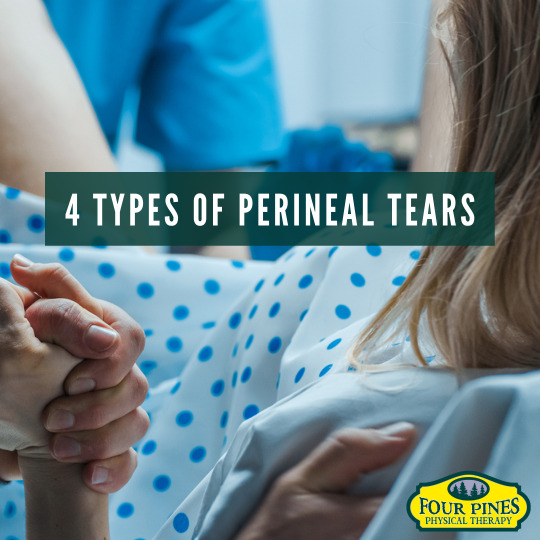#pelvictearing
Text
4 Types of Perineal Tears

By Dr. Morgan Kinnes
What do ACLs and Perineums have in common? Maybe more than you think. Both are commonly injured, there are up to 200,000 ACL injuries per year in the United States and 90% of women have some degree of perineal tearing while giving birth (this is almost 4 million perineal injuries every year), and both require rehabilitation.
Let’s back up a little bit. The perineum is the area of tissue in between the vagina or base of the penis and the anus and is made up of skin, fat tissue, and the pelvic floor muscles and contains quite a few nerve endings. During vaginal birth, the perineal tissue stretches to allow the baby’s head to exit the vagina and this sometimes results in a tear. Perineal tears can lead to urinary or fecal incontinence and pelvic pain with sexual intercourse.
There are four different degrees of tears indicating the severity of injury and tissues involved.
First degree: Tearing of the skin
Second degree: Some tearing of pelvic floor muscles and skin
Third Degree: Tearing of skin, pelvic floor muscles, and partial tear of the anal sphincter
Fourth Degree: Tearing of skin, pelvic floor muscles, and complete tear of the anal sphincter and into the lining of the bowel.
Sometimes mom’s position during labor or the use of an instrument (forceps or a vacuum) can increase the risk of tearing. The typical birthing position of mom lying on her back with her feet up in stirrups or laying as if in a recliner increases the risk of perineal tearing. There are many different options for laboring positions that can reduce the risk of tearing that you can discuss with your provider. Perineal massage is another way to decrease the risk of perineal tears. Perineal massage should be done 1-2 times per week beginning around 35 weeks.
There is good news for new moms. Just like ACL injuries, a physical therapist can help address symptoms following a perineal tear. Pelvic Health Physical Therapists have specialized training and are experts in treating urinary and fecal incontinence and pelvic pain. ACOG (American College of Obstetricians and Gynecologists) recommends every person who has given birth see a Pelvic Health PT to address any issues they are having and prevent any further issues.
Reach out to Four Pines Physical Therapy in the Jackson & Alpine, Wyoming area to develop a personalized care plan today! We have the best physical therapists in Wyoming! If you are not in the Jackson or Alpine, Wyoming area look for a physical therapist near me in your area online.
#fourpinespt#jacksonhole#jacksonwy#Jackson Wyoming#Wyoming#physicaltherapy#pelvicpain#birthing#childbirth#pelvictearing#perineal#postnatal#prenatal#pregnancy#pregnant#alpinewy#physicaltherapywyoming
0 notes